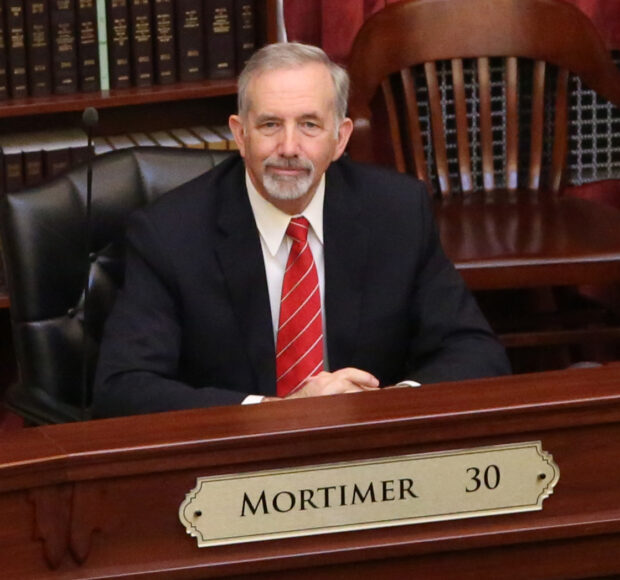The timetable for writing the K-12 budgets is coming into focus.
The Joint Finance-Appropriations Committee is scheduled to write public school budgets on Feb. 27, Paul Headlee of the Legislative Services Office said Monday morning. JFAC is scheduled to write the higher education budget on Feb. 28.
The K-12 budgets are the largest spending bills to come out of JFAC. Every year, the committee’s action also marks a milestone — foreshadowing the final weeks of a legislative session. Legislative leaders have said they hope to wrap up the 2017 session on March 24, after the K-12 budgets and other spending bills work their way through both houses and reach Gov. Butch Otter’s desk.
On Monday morning, Headlee walked the House Education Committee through two competing K-12 budgets — Otter’s spending plan and state superintendent Sherri Ybarra’s proposal.
The dollar difference is relatively minor. Ybarra is seeking $4.2 million more for 2017-18, a small gap in budget requests nearing $1.7 billion. But there are a few key political and policy differences between the two budgets, and House Education honed in on these differences Monday morning.
Otter wants $2.5 million to train school administrators who perform teacher evaluations — and he wants to give this money to the State Board of Education. Ybarra wants $300,000, and wants to keep this smaller sum of money within her State Department of Education.
Evaluations are a key accountability piece in the career ladder, Idaho’s five-year plan to boost teacher salaries. Otter and key legislators say they want the evaluations process fixed, as a condition to funding pay raises. In 2016, the Legislature moved oversight of evaluations from SDE to the State Board.
Meanwhile, Ybarra wants to increase “operational funding” for schools — a sum that the Legislature has finally restored to 2009 levels of $25,696 per classroom. Ybarra wants an increase to $26,467 per classroom. Otter doesn’t want an increase in operational funding. Instead, he wants to create a $15 million line item for health insurance — a growing expense districts frequently cover through operation spending.
The next step in the K-12 budget process comes Friday morning, when House Education Committee Chairwoman Julie VanOrden speaks to JFAC. Chairs of the policymaking committees appear before the budget-writers each session, to pass along their committees’ budget recommendations.
Budget reserve bill passes Senate
The Senate quickly passed a bill that might lead to siphoning more money into K-12’s savings account.
Senate Bill 1041 would require the budget-writing Joint Finance-Appropriations Committee to consider replenishing the Public Education Stabilization Fund, a piggy bank dedicated to K-12.
For example, if the state withdrew $10 million from savings to cover unexpected enrollment growth, JFAC would have to consider putting $10 million back into the fund. The deposit isn’t required, but the committee would be required to discuss making a deposit.
With the Senate’s 34-0 vote, SB 1041 heads to the House.
Senate Education introduces new bills on deadline
Working against the clock, the Senate Education Committee introduced four new bills in a flurry of activity Monday afternoon.
The bills may be among the last new pieces of legislation to go before Senate Education. Monday was the deadline to introduce bills in “non-privileged” committees such as Senate Education. From here, any new bills would first need to run through one of the Legislature’s privileged committees.

One bill introduced Monday would create a new fund that school districts would use to pay their employee health care costs.
Senate Education Chairman Dean Mortimer pushed the new bill, saying it is designed to align with Gov. Butch Otter’s request to set aside $15 million to help districts cover their employees’ health care costs.
“This is specifically saying that they money that goes into there would be used for health insurance, and it would be in the same amount as that in which state employees get,” said Mortimer, R-Idaho Falls.
Another bill deals with sharing criminal background checks for prospective new teachers.
Another addresses Medicaid reimbursement programs for students and schools.
The fourth bill would give school districts another option for earning salary incentives and bonuses known as master teacher premiums. Districts would be able to use metrics involving student academic goals as an alternative to basing premiums on teacher evaluations and educator portfolios.
Each bill could come back for a full hearing in Senate Education in the days or weeks ahead.
While Senate Education worked quickly to introduce those bills before deadline, there was no discussion or action on Superintendent of Public Instruction Sherri Ybarra’s proposed rural schools support center. Ybarra and her staff have repeatedly said the rural schools initiative is a top priority this legislative session. Her chief policy officer has been shopping a draft version of a bill around since at least early January. However, the proposal has yet to appear on any legislative agenda or come up for introduction.
Missing the Senate deadline means the rural schools center will likely need to be routed through the House Education Committee, which can introduce new bills until the legislative session adjourns.
Last year, Ybarra successfully steered a version of the rural schools center through the House, but the proposal died at the end of the year without the Senate ever taking it up.
Idaho Education News reporter Clark Corbin contributed to this report.
